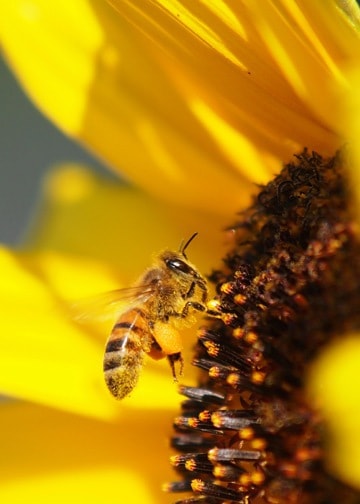Honeybees—directly or indirectly—are responsible for one third of everything you eat. These lovely little insects supply our diets with a great deal of our nutritional needs, as well as diversity and pizzazz. Do you like kiwis? Thank the honeybee. Do you enjoy cashews? Thank the beekeeper. Are you fond of watermelon? Thank them both! Honeybees are essential for the pollination of 13 different crops and make a significant contribution to the production of well over 100 foods we enjoy. And not just exotic foods—the honeybee is also responsible for everyday, taken-for-granted foods such as onions, celery, broccoli, bell peppers, coffee, cucumbers, squash, and carrots. And that’s just naming a few.
We could stop right there and conclude that honeybees are vital to our way of life—and as such, worth saving. But that’s only part of the story. The valuable pollination service provided by the honeybee is a mere by-product of their main focus. Their mission—and it’s a laborious one—is to fetch nectar from flowers. In this beautiful, synergistic relationship, the honeybee is visually attracted to the flower, which contains nectar. During the struggle to gain access to this sweet-smelling liquid, the insect gathers pollen from the male part of one flower then delivers it to the receptive female tips, known as the stigma, of another. Quite literally, honeybees are engaged in plant sex. For all their hard work, their reward is an average haul of 20–40 mg. of nectar per trip. Once this is collected, they must then fan the nectar with their wings to reduce the water content from as much as 80 percent down to 18.6 percent or less. The result is honey—the sweet, delicious incentive for beekeeping. In fact, as anyone familiar with honey contests will tell you, nectar with a moisture content any higher than 18.6 percent is automatically disqualified. The reason? It’s not honey.
The health benefits of hive products extend far beyond the food security afforded by honeybee labor. Not only is honey itself a powerful antibiotic, it may even provide long-sought answers for scientists trying to solve the problem of antibiotic-resistant bacteria. Honey can be used topically to heal wounds and may possibly help with sleep. The list goes on. To learn more, check out The Honey Revolution by Dr. Ron Fessenden, MD, MPH. Other hive products such as propolis, pollen, bee bread, wax, and even venom have positive impacts on human health, as suggested both by scientific studies and anecdotal evidence.
This author suffers from arthritis in his right shoulder. Out of curiosity, I intentionally allowed honeybees to sting my right shoulder beginning in March of 2013 and many times over the course of the growing season—even as recently as yesterday. As of this writing, in October of 2013, I have regained nearly 100 percent mobility. Coincidence? Possibly. But I don’t think so.
The world of honeybees is truly fascinating. As a beekeeper, I’m presented with what sometimes seems like an infinite number of things to learn—and I love to learn. If you’re considering this as a hobby, let me encourage you. We need all the beekeepers we can get! And unlike many other hobbies, beekeeping at least has the potential to pay for itself. Raw, local honey demands a premium price. If you’re fortunate enough to get a harvest, your honey should demand at least twice the price of honey at the local chain grocery.
Meanwhile, check back here for more informative articles about beekeeping, the world of honeybees, and their connection to human health.
Photo by Steven Kennedy


